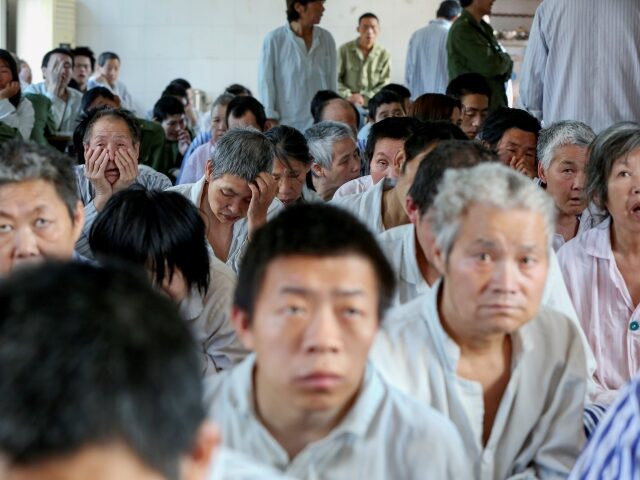A human rights organization called Safeguard Defenders published a report on Tuesday charging the Chinese Communist Party with using psychiatric hospitals to imprison political dissidents.
The report, entitled Drugged and Detained: China’s Psychiatric Prisons, said Chinese officials are “sending petitioners and activists to psychiatric wards for medically unnecessary compulsory treatment.” Some of the victims are left in these facilities for years on end.
Safeguard Defenders researched 99 cases of people imprisoned in psychiatric wards for political reasons, spread across 21 different regions of China. The group said its research was only “the tip of the iceberg” because dictator Xi Jinping has created a “climate of fear” that makes it difficult to interview victims and their families.
The Chinese Communist Party was busted for politically abusing psychiatric facilities a decade ago. Under intense pressure from around the world, Beijing passed a “mental health law” that would supposedly make it more difficult to order compulsory treatment, with courts exercising more oversight of “police-enforced psychiatric commitment.”
Tuesday’s report made it clear “these legal reforms have absolutely not worked,” as arbitrary psychiatric commitment continued unabated. One of the victims studied by Safeguard Defenders had been subjected to compulsory mental treatment twenty times. Almost a third of the 99 subjects in the report had been committed at least twice. Nine of them were imprisoned for over ten years.
The abuse suffered by these dissidents, as described, was horrendous:
Locked up, many patients were physically and mentally abused. They were subjected to painful electroconvulsive therapy, often without anesthesia; tied to their beds where they were left for hours to lie humiliated in their own waste; and beaten and isolated (contact with their family or lawyers through visits or phone calls was blocked).
Even after release, victims suffer from serious physical and psychological trauma including dramatic weight loss, scars from being left for hours tied up in soiled clothes, and marked loss of muscle strength.
The forced medication has also left enduring mental scars including signs of dementia in even young victims, night terrors, tremors and suicidal thoughts.
The report said Chinese officials are fond of using these terror tactics against dissidents because it discredits and stigmatizes them, muzzles them while they are in the hospitals, and terrorizes them into silence after they leave. Institutionalizing activists and “petitioners” – people with a grievance the government does not feel like addressing – also “offers longer-term detention without the trouble of going through formal arrest and trial.”
The families of several victims told researchers they thought the police were prone to ordering compulsory mental treatment for older people — and those with health problems — because regular detention centers might refuse to “take on the extra burden of taking care of their health needs” or suffering “bad press” if they died in detention.
The practice is so widespread that Chinese citizens have a name for it: bei jing shen bing, which means “getting mentally-illed.” Chinese state media once used the term to describe scandalous abuse of psychiatric facilities, but that ended when the paranoid Xi Jinping came to power and decided to start mentally-illing dissidents on an industrial scale.
One of the cases studied by Safeguard Defenders was a Shanghai woman in her early 30s named Dong Yaoqiong, who became known as “Ink Girl” because she posted a video of herself splashing ink on a picture of Xi Jinping to protest his “tyranny.” She was quickly arrested and shipped off to a mental hospital for 16 months.
Another victim was Andy Li, one of twelve Hong Kong pro-democracy protesters who attempted to flee to Taiwan in a speedboat in 2020, only to be intercepted by Chinese officials. Li disappeared into thin air after he was hauled back to Hong Kong. It was later discovered that he had been tossed into a psychiatric facility in Hong Kong, without notifying his family.
“Li’s case appears to be a worrying sign that the political abuse of psychiatry practiced on the mainland is now being exported into Hong Kong following the introduction of the draconian National Security Law in 2020,” Safeguard Defenders observed.
Some of the dissidents who get “mentally-illed” do not survive the experience. The report noted that Chinese psychiatric hospitals have a poor record of treating other medical issues and sometimes refuse to release involuntarily-committed prisoners to undergo treatment at medical facilities.
One example was a petitioner named Zeng Jiping, who spent two years in a mental hospital and then died from the cancer it refused to treat, even though his family pleaded with the psychiatrists to let him visit a cancer ward. Safeguard Defenders suspected Zeng was only allowed to leave the mental hospital to die at home so the hospital would be spared the embarrassment of him dying in their care. His son said he was never given any medication except painkillers.
The report concluded with a plea for the Chinese government to “take immediate steps to put a stop to the political abuse of psychiatry in the country,” release all political prisoners, and provide them with “compensation for their ordeal.”

COMMENTS
Please let us know if you're having issues with commenting.